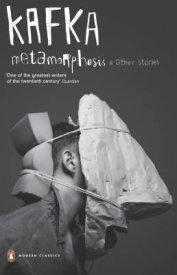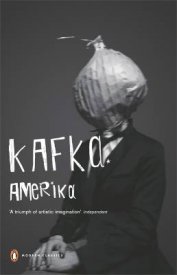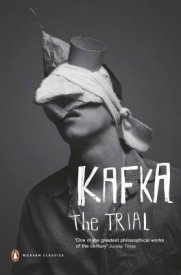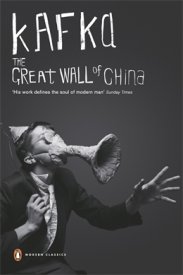Shade
New Member
Ah, Kafka. One of the few twentieth century writers who can truly be known by surname alone, not least because it spawned an adjective (although, as Martin Amis points out, it has become wildly devalued to the point where a long queue in the post office is described as kafkaesque). Until this week I had only read a few of the stories that were published during his lifetime, like 'Metamorphosis' and this brief bright gem, 'Before the Law.' Reading these flawless pieces you really feel he deserves that adjectival honour.
As is widely known, Kafka left strict instructions to his friend Max Brod to burn all his writings that hadn't been published during his lifetime, including a whole bunch of other stories and the three unfinished and (then) untitled novels, The Trial, The Castle and Amerika (or America, depending on what edition you have). Of course Brod did nothing of the sort, and named the novels and published them. And who, faced with the possibility of rescuing a great writer from obscurity, combined with the blindness of having a gigantic cheque placed over one's eyes, can say they would have done it differently?
But, reading The Trial this week, I wish he hadn't. It turns out, I think, that Kafka was not only a great writer but a really great judge of his own work. The Trial doesn't stand up. As someone who believes Nabokov's dictum that showing unfinished work is akin to handing round specimens of your own sputum - and who has never felt enthused to read his own copies of The Last Tycoon or The Salmon of Doubt - I had my suspicions about The Trial from early on. Completion is a necessary requirement of a work of art. These suspicions redoubled when I read in the appendix to one edition that Brod had not only titled the novel (as there's no actual trial in it, the German Der Prozess seems more fitting), but also ordered the chapters, other than the first and last (which does end the book pretty definitively, but Kafka apparently intended to write much more for the middle of the book). So immediately I should have let go of any hopes that there might be a followable plot. Instead what we get is a series of vignettes, where the put-upon 'hero' Josef K. meets various people and officials and non-officials in an attempt to put paid to the unfair proceedings which have been brought against him by the state.
As a classic, The Trial has all the muddled expectations that come with any well-known book. I supposed, for example, that at the beginning of the novel Josef K. would be arrested for a crime he did not commit, taken into custody and be subjected to a series of escalating processes of demeaning confusing humiliation by the state, full of circular crosstalk and unresolved reflexive arguments. There would perhaps be almost circles of hell for K. to pass through, each more baffling and clinically bureaucratic than the last; until, eventually, separated from society and reason, K. would take his own life. All lovely and symbolic.
Well if you fancy writing that book, go ahead, because Kafka didn't. Instead there are only two scenes of confrontation with authority: the opening scene, where K. is told he is under arrest and - that's it - left to be; and a scene where he appears before a crowded room of magistrates and the public, and nothing much happens. Other than that he is not required to do anything and never is he taken anywhere against his will. The dialogue is filled with non-sequiturs - rather as the chapters themselves do not necessarily follow on from one another - and is rendered semi-impenetrable by Brod's, or the publisher's, or the translator's, slavish adherence to Kafka's 'idiosyncratic' punctuation (hardly any paragraphs; dialogue running without line breaks; commas between speech and action appearing and disappearing randomly). The prose should be clear and lucid, to contrast with the muddied and complex ways of the law and the state (or it should, if the book was actually about those things, which it's not, so it isn't). And speaking of translations, here is the classic opening of The Trial, by Willa and Edwin Muir, who first brought us Kafka in English (and this novel in 1935):
Solid and elegant, you might think. Someone must have been telling lies about Joseph K. Great stuff. It has resonance. So why did the translator of my edition (first published in English in 1994) feel the need to say:
Made a false accusation? Now how idiomatic is that? The back cover is even worse, where it becomes "laid a false accusation." But perhaps this policy of adopting overdone locutions is appropriate for Kafka's overdone (yet incomplete) novel.
To be perfectly honest, I didn't even reach the end of my edition; put off by the absolutely certain knowledge that nothing of significance - or assistance in understanding - was going to happen, I gave up about two-thirds of the way through. Which enables me to quote Amis again, accurately, when he said "I have never been able to finish one of Kafka's novels. But then neither could Kafka."
As is widely known, Kafka left strict instructions to his friend Max Brod to burn all his writings that hadn't been published during his lifetime, including a whole bunch of other stories and the three unfinished and (then) untitled novels, The Trial, The Castle and Amerika (or America, depending on what edition you have). Of course Brod did nothing of the sort, and named the novels and published them. And who, faced with the possibility of rescuing a great writer from obscurity, combined with the blindness of having a gigantic cheque placed over one's eyes, can say they would have done it differently?
But, reading The Trial this week, I wish he hadn't. It turns out, I think, that Kafka was not only a great writer but a really great judge of his own work. The Trial doesn't stand up. As someone who believes Nabokov's dictum that showing unfinished work is akin to handing round specimens of your own sputum - and who has never felt enthused to read his own copies of The Last Tycoon or The Salmon of Doubt - I had my suspicions about The Trial from early on. Completion is a necessary requirement of a work of art. These suspicions redoubled when I read in the appendix to one edition that Brod had not only titled the novel (as there's no actual trial in it, the German Der Prozess seems more fitting), but also ordered the chapters, other than the first and last (which does end the book pretty definitively, but Kafka apparently intended to write much more for the middle of the book). So immediately I should have let go of any hopes that there might be a followable plot. Instead what we get is a series of vignettes, where the put-upon 'hero' Josef K. meets various people and officials and non-officials in an attempt to put paid to the unfair proceedings which have been brought against him by the state.
As a classic, The Trial has all the muddled expectations that come with any well-known book. I supposed, for example, that at the beginning of the novel Josef K. would be arrested for a crime he did not commit, taken into custody and be subjected to a series of escalating processes of demeaning confusing humiliation by the state, full of circular crosstalk and unresolved reflexive arguments. There would perhaps be almost circles of hell for K. to pass through, each more baffling and clinically bureaucratic than the last; until, eventually, separated from society and reason, K. would take his own life. All lovely and symbolic.
Well if you fancy writing that book, go ahead, because Kafka didn't. Instead there are only two scenes of confrontation with authority: the opening scene, where K. is told he is under arrest and - that's it - left to be; and a scene where he appears before a crowded room of magistrates and the public, and nothing much happens. Other than that he is not required to do anything and never is he taken anywhere against his will. The dialogue is filled with non-sequiturs - rather as the chapters themselves do not necessarily follow on from one another - and is rendered semi-impenetrable by Brod's, or the publisher's, or the translator's, slavish adherence to Kafka's 'idiosyncratic' punctuation (hardly any paragraphs; dialogue running without line breaks; commas between speech and action appearing and disappearing randomly). The prose should be clear and lucid, to contrast with the muddied and complex ways of the law and the state (or it should, if the book was actually about those things, which it's not, so it isn't). And speaking of translations, here is the classic opening of The Trial, by Willa and Edwin Muir, who first brought us Kafka in English (and this novel in 1935):
Someone must have been telling lies about Joseph K., for without having done anything wrong he was arrested one fine morning.
Solid and elegant, you might think. Someone must have been telling lies about Joseph K. Great stuff. It has resonance. So why did the translator of my edition (first published in English in 1994) feel the need to say:
Someone must have made a false accusation against Josef K., ...
Made a false accusation? Now how idiomatic is that? The back cover is even worse, where it becomes "laid a false accusation." But perhaps this policy of adopting overdone locutions is appropriate for Kafka's overdone (yet incomplete) novel.
To be perfectly honest, I didn't even reach the end of my edition; put off by the absolutely certain knowledge that nothing of significance - or assistance in understanding - was going to happen, I gave up about two-thirds of the way through. Which enables me to quote Amis again, accurately, when he said "I have never been able to finish one of Kafka's novels. But then neither could Kafka."



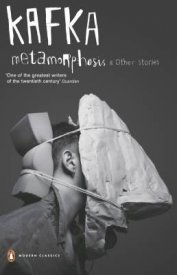
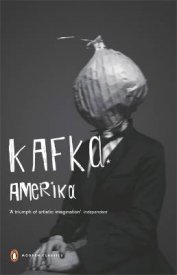
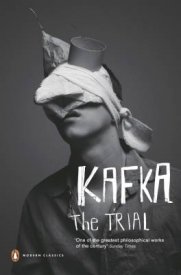
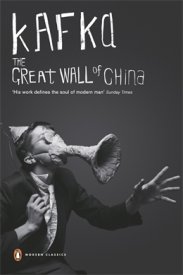
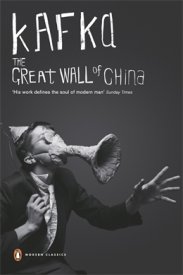
 Who knows if Kafka ever wanted the people who enjoy reading him to enjoy reading him at all? Obviously he didn't. Sure, some people love his stuff, but does anyone stop to consider poor Franz' thoughts? Well, do you?
Who knows if Kafka ever wanted the people who enjoy reading him to enjoy reading him at all? Obviously he didn't. Sure, some people love his stuff, but does anyone stop to consider poor Franz' thoughts? Well, do you? 
